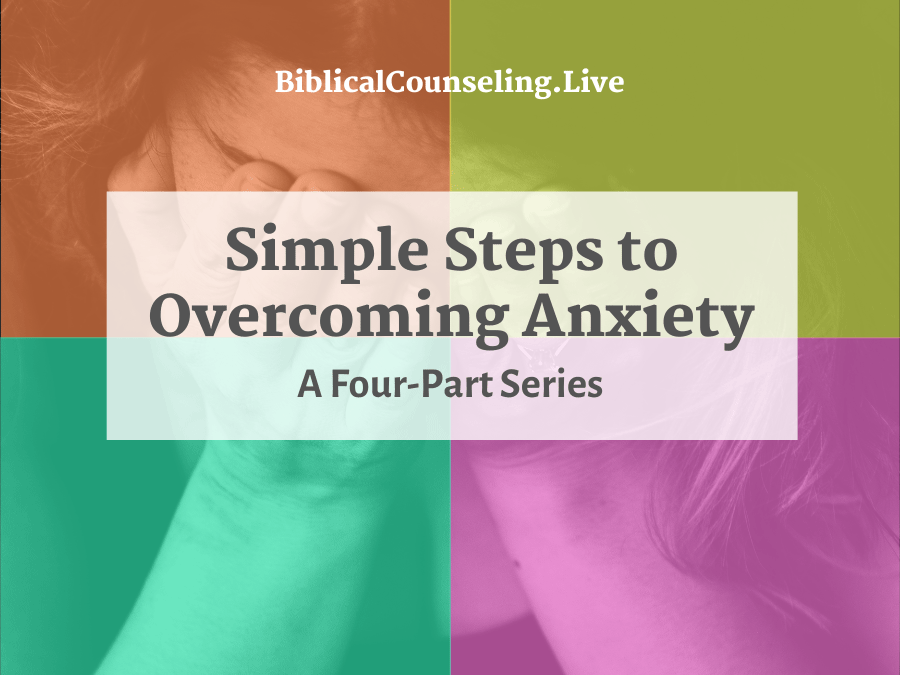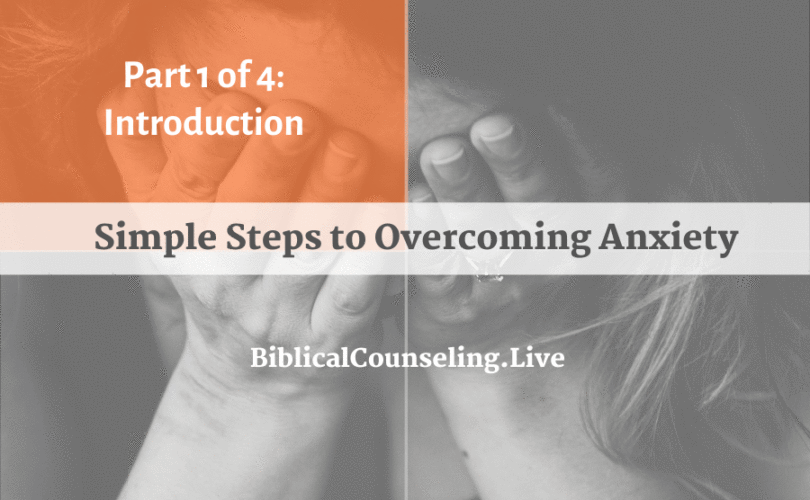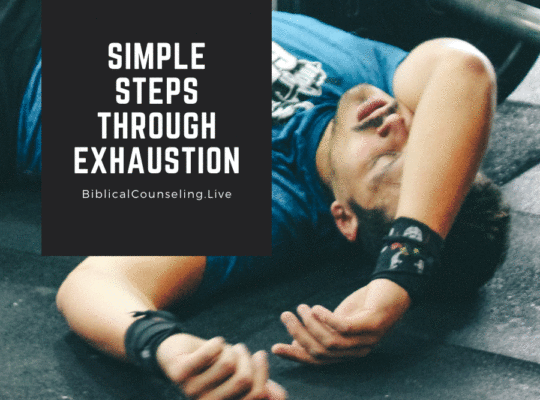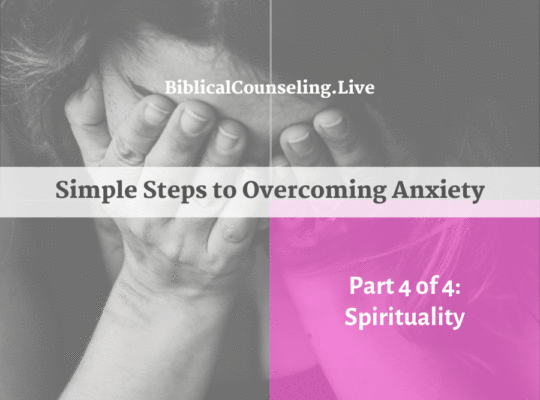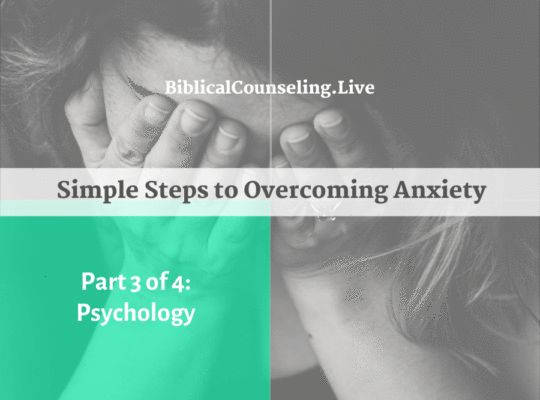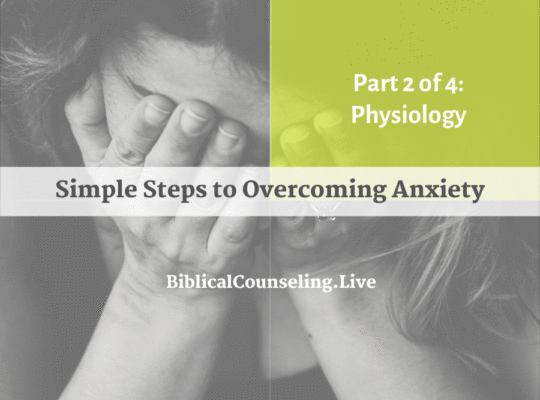Original Post Date: June 1, 2019
Part 1 of 4
The first time I had an anxiety attack, I thought I was dying. I was in college. It was the end of the semester, I was playing Puck in the school’s production of A Midsummer Night’s Dream, I was carrying 18 units, I was downing a couple of liters of Diet Coke a day to keep up (this was long before coffee was THE thing), and I wasn’t eating or sleeping well. It was long enough ago that I don’t remember the details, but I do remember that I couldn’t stop crying… for about three days.
Through that, I learned that I had serious issues with generalized anxiety. They were disguised as perfectionism, pride, and fearing what others would think, but they were there and affecting my relationships as well as my health.
By the time I was 25 I had been in a car accident every year since I was 16, and only one was my fault. When I was driving, if any cars around me made any sudden moves, my heart rate would skyrocket. This of course led to the shaking, trembling, and sweating… which led to me feeling like I was going to pass out… which is not a good feeling when you’re on the freeway in Los Angeles.
My next anxiety attack was about two months after I stopped nursing my youngest child. For the first time in about six years, I wasn’t pregnant or nursing, and my body spun out of control with the hormone shift back to normal. Every two to three hours, my heart would start racing, my limbs would go numb, and I wouldn’t be able to breathe. Time, vitamins, and protein fixed that one.
A few years later, I took an antibiotic that damaged my nervous system. Every morning at about 4:30, I would wake out of a deep sleep, covered in sweat with my heart racing; and I would run to the bathroom to take care of all the items that were being ejected from my body.
During the day, light, sound, smell, temperature… any small stress, even something as simple as laughing out loud, would trigger panic symptoms. It took years for my body to heal from that, and to this day I still experience symptoms when exposed to LED lights, flickering lights, certain sound frequencies (like the bass in a boom-boom car next to me on the road), a change in blood sugar, or extreme temperatures.
In 2015, when my oldest daughter died suddenly of an undiagnosed heart condition, there were nights when I woke up in a panic, confused as to where she was. During the day, if any of my other kids were out of my sight I had to fight the anxiety that they, too, would drop dead. It was a fairly reasonable fear, because two of my other kids were diagnosed with the same condition and were awaiting ICD placement. As time passed, the battle against the fears subsided.
This past year, I started having anxiety symptoms again. They seemed so random. I was confused until I realized they were coinciding with certain times of the month, and I was beginning to get hot flashes. Hormones again. Fun.
For Christians, general or debilitating anxiety can be a hard thing to understand. Some of the situations I described above seem like they describe a physical problem, not a spiritual one. Yet, Philippians 4:6-7 commands us: Do not be anxious for anything. So was I in sin at 4:30am when I leapt out of bed in full panic mode? What about when I was concerned about my kids dying?
Anxiety is the most common complaint in both secular and biblical counseling. The problem is, the word, anxiety, actually means different things to different people in different contexts, so the First Step in overcoming anxiety is to be very clear what you are talking about when you use the word anxiety.
In this and the next three posts, we will be discussing in more detail how to gain a biblical understanding of the following aspects of anxiety:
1. The Physiology of Anxiety
When we talk about anxiety as a medical condition, we are talking about physical symptoms caused by the fight-or-flight response (AKA stress response) in our bodies. This is a complex hormonal and chemical response that happens instantaneously when we perceive danger. This God-given, superhuman surge of hormones is incredibly helpful when it happens at the right time. It is debilitatingly unhelpful when it happens outside of dangerous situations.
2. The Psychology of Anxiety
When psychologists or psychiatrists seek to address anxiety, they deal with the physiological issues to the extent that they will try to relieve the fight-or-flight response that is resulting from mental (organic or behavioral) miscues. Psychiatrists may even prescribe medication to dampen the physical symptoms.
Some psychiatrists will seek to uncover underlying traumas and repressed desires in an effort to remove internal conflict. Others will usually seek to resolve conflicted thinking and conflicted behavior patterns. The underlying assumption is that people are inherently good and able to return to a non-conflicted way of thinking and behaving.
3. The Spirituality of Anxiety
The Bible describes anxiety by using various Greek and Hebrew words. The most commonly quoted anxiety verse, Philippians 4:6, uses the Greek word, merimnaō, which means to have care, or take thought. In other places in scripture, anxiety is called borrowing trouble, worry, fear, distraction, or troubling yourself. Biblically, anxiety as a sin is a soul and heart issue – one in which a person does not trust in the good and sovereign God for the outcome of all situations.
Therefore, you can see how confusing talking about anxiety can be. The speaker and the listener might have very different paradigms for the same word.
In addition, anxiety overlaps. For example, one person may have anxiety that starts as a spiritual issue – sinning in anxious thoughts – which leads to physical symptoms. So treating the symptoms doesn’t help because the thoughts keep signaling the body to respond appropriately to the perceived danger. In another case, someone who experiences helpful anxiety/fear during a car crash might later experience unhelpful anxiety/fear every time she gets in a car. Someone else might experience physical symptoms of anxiety and then be led to sin with anxious thoughts.
No matter what your experience with anxiety, rest assured that you are not alone. Every person on Earth experiences anxiety. Even Jesus experienced anxiety (Different translations: deeply troubled, deeply anguished, very sorrowful, distressed, grieved, and anxious) in the Garden of Gethsemane; He just didn’t give in to sinning! (Matt. 26:37-39).
The God who created mankind knows your frame (Ps. 103:14) and provides compassion and understanding through His people and His Word (2 Cor. 1:3-7, 2 Tim. 3:16-17).
Up Next… Simple Steps to Overcoming Anxiety: Physiology (Part 2)
Resources:
- Counseling Conference Session: Depression and Anxiety, by Dr. Laura Hendrickson
- Link to Anxiety Archives at ACBC ‘s website.
Books
- Overcoming Fear, Worry, and Anxiety by Elyse Fitzpatrick
- Idols of the Heart by Elyse Fitzpatrick
- Courage: Fighting Fear with Fear by Wayne and Joshua Mack
- When People Are Big and God Is Small: Overcoming Peer Pressure, Codependency, and the Fear of Man by Edward T. Welch
- The Process of Biblical Change by Julie Ganschow
